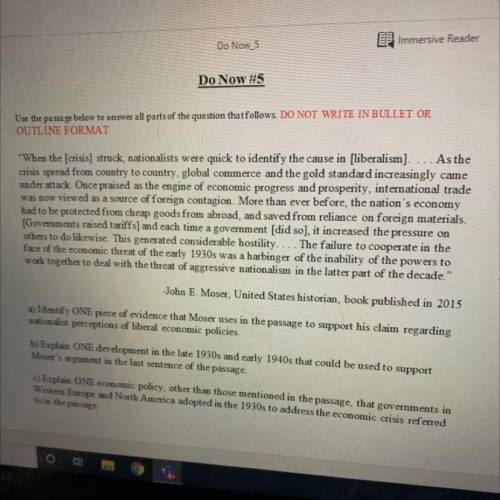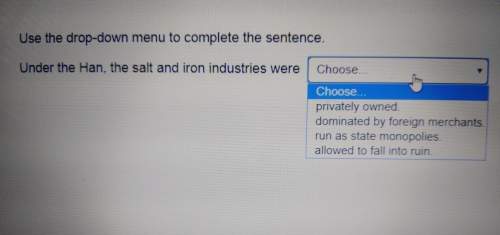
History, 25.02.2021 20:10 kprincess16r
"When the ſcrisis) struck, nationalists were quick to identify the cause in (liberalism)... As the
crisis spread from country to country, global commerce and the gold standard increasingly came
under attack. Once praised as the engine of economic progress and prosperity, international trade
was now viewed as a source of foreign contagion More than ever before, the nation's economy
had to be protected from cheap goods from abroad, and saved from reliance on foreign materials.
[Governments raised tariffs) and each time a government [did so], it increased the pressure on
others to do likewise. This generated considerable hostility. The failure to cooperate in the
face of the economic threat of the early 1930s was a harbinger of the inability of the powers to
work together to deal with the threat of aggressive nationalism in the latter part of the decade."
John E Moser, United States historian, book published in 2015
a) Identify ONE piece of evidence that Moser uses in the passage to support his claim regarding
nationalist perceptions of liberal economic policies,
b) Explain ONE development in the late 1930s and early 1940s that could be used to support
Moser's argument in the last sentence of the passage.
c) Explain ONE economic policy, other than those mentioned in the passage, that governments in
Western Europe and North America adopted in the 1930s to address the economic crisis referred
to in the passage.


Answers: 2
Another question on History

History, 21.06.2019 16:00
Which document does the second paragraph of the declaration of independence echo
Answers: 1

History, 21.06.2019 19:00
If you lived in greece in about 300b.c. you had a good chance of witnessing which of the following? select all that apply
Answers: 1


History, 22.06.2019 06:00
What was the name of the totalitarian party in italy? a. nazib. communistsc. fascists d. socialist
Answers: 1
You know the right answer?
"When the ſcrisis) struck, nationalists were quick to identify the cause in (liberalism)... As the...
Questions










Business, 03.03.2022 15:00

Mathematics, 03.03.2022 15:00



English, 03.03.2022 15:00

History, 03.03.2022 15:00


Geography, 03.03.2022 15:00


SAT, 03.03.2022 15:00

Mathematics, 03.03.2022 15:00




